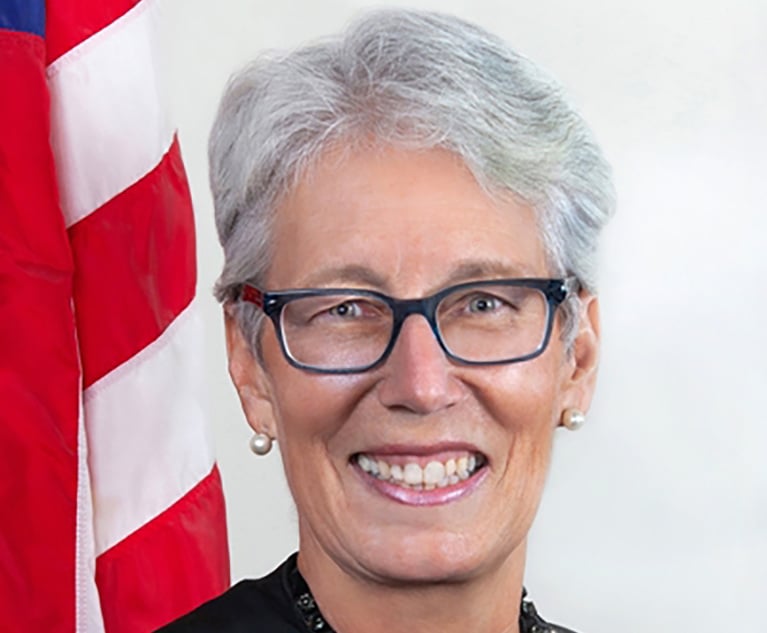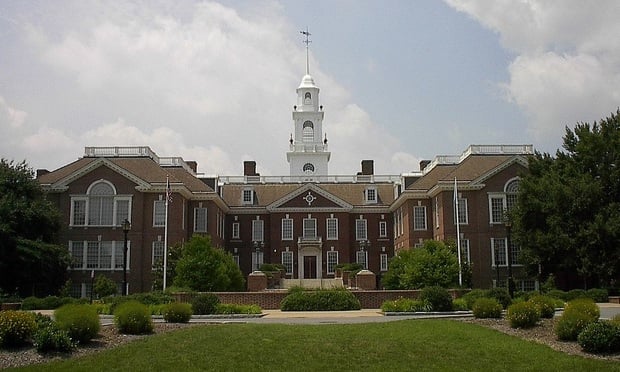 Vice Chancellor Joseph Slights, Delaware Chancery Court (Courtesy photo)
Vice Chancellor Joseph Slights, Delaware Chancery Court (Courtesy photo)Slights Criticizes State's Tactics in Delaware Unclaimed Property Lawsuit
"The state continues to press its strategy of having two courts litigate the same constitutional challenges to the same Delaware statutes at the same time," the vice chancellor said.
May 08, 2019 at 11:48 AM
4 minute read
The original version of this story was published on Delaware Law Weekly
A Delaware Chancery Court judge on Monday criticized the state's tactics in trying to force an Illinois-based company to comply with an unclaimed-property audit, saying it was trying to have the constitutionality of the state's escheat laws litigated in two courts at the same time.
Vice Chancellor Joseph R. Slights III, in an 11-page order, said an earlier stay on the state's enforcement action should remain in place while Univar Inc. proceeds with its federal court challenge to the state's ability to subpoena corporate records going back decades.
In his ruling, Slights said the Department of Finance had waited until Univar filed its lawsuit to bring its Chancery Court enforcement action and then refused to seek expedited resolution of threshold constitutional and preemption issues in the U.S. District Court for the District of Delaware.
“Rather than prosecute that motion, however, the state continues to press its strategy of having two courts litigate the same constitutional challenges to the same Delaware statutes at the same time,” Slights said. “The inefficiencies of this approach are apparently lost on the State. They are not lost on the court.”
The ruling came in response to Delaware's application for a fast-tracked review of Slight's order last month, which granted Univar's motion to stay the Chancery Court case. The maneuver, known as interlocutory appeal, aimed to send the issue straight to the state's five justices, on the grounds that it raised a novel issue of Delaware law and challenged the constitutionality of state statute.
Attorneys for the Department of Finance argued that a provision of state law charged the Chancery Court with “expeditiously” hearing enforcement actions arising under Delaware's unclaimed property collection laws and that Slight's order, for the first time, touched on the question of whether such actions could be stayed.
The stay, they argued, improperly would allow a federal judge to decide constitutional questions that ought to be left to the state court.
“The order also results in the district court, rather than this court, having the first opportunity to determine the constitutionality, construction, and application of the escheats law, even though the plain language of the statute at issue vests jurisdiction for enforcement actions in the Court of Chancery and requires expeditious consideration by the court,” the state's Loeb & Loeb and Young, Conaway, Stargatt & Taylor wrote in their application.
Slights, however, said the state's arguments “ring hollow when considered against its audit and litigation strategies.”
According to Slights' ruling, the state had initiated its audit of Univar, a global chemical and ingredients distributor, in 2015, and first sought the records in 2016. At the time, Slights said, officials knew about Univar's constitutional objections but waited nearly two years to issue its subpoena last October.
It wasn't until after Univar sued in December that the state decided to “rush” to the Court of Chancery to file its enforcement action, he said.
“Even though it knew Univar challenged the statute upon which the subpoena was issued on constitutional grounds, the state did not promptly initiate an action to enforce its subpoena,” Slights wrote.
A spokeswoman from the Department of Finance did not respond Tuesday afternoon to a call seeking comment on the ruling, and an outside attorney for the state was not immediately available to comment.
Univar, in its federal lawsuit, has claimed that audit is an unreasonable search and seizure, which subjects the company to an unconstitutional taking by the government and deprives it of its due-process rights under the Fourteenth Amendment.
The state is represented in the enforcement action by Caroline Lee Cross and Elizabeth R. McFarlan of the Delaware Department of Justice, as well as Steven S. Rosenthal, Tiffany R. Moseley and John David Taliaferro of Loeb & Loeb in New York and Melanie K. Sharp, Martin S. Lessner, Mary F. Dugan and James M. Deal of Young Conaway in Wilmington.
Univar is represented by Michael P. Kelly, David A. White and Matthew J. Rifino of McCarter & English and Jameel S. Turner and James G. Ryan of Bailey Cavalieri in Columbus, Ohio.
The enforcement action, filed in the Court of Chancery, is captioned State of Delaware v. Univar.
This content has been archived. It is available through our partners, LexisNexis® and Bloomberg Law.
To view this content, please continue to their sites.
Not a Lexis Subscriber?
Subscribe Now
Not a Bloomberg Law Subscriber?
Subscribe Now
NOT FOR REPRINT
© 2024 ALM Global, LLC, All Rights Reserved. Request academic re-use from www.copyright.com. All other uses, submit a request to [email protected]. For more information visit Asset & Logo Licensing.
You Might Like
View All

Jurden Announces 2025 Retirement, Capping 24 Years on Superior Court
3 minute read

Rare Opposition to Proposed Del. Corporate Law Changes Is Voiced to House Committee
5 minute readTrending Stories
- 1Judge Denies Sean Combs Third Bail Bid, Citing Community Safety
- 2Republican FTC Commissioner: 'The Time for Rulemaking by the Biden-Harris FTC Is Over'
- 3NY Appellate Panel Cites Student's Disciplinary History While Sending Negligence Claim Against School District to Trial
- 4A Meta DIG and Its Nvidia Implications
- 5Deception or Coercion? California Supreme Court Grants Review in Jailhouse Confession Case
Who Got The Work
Michael G. Bongiorno, Andrew Scott Dulberg and Elizabeth E. Driscoll from Wilmer Cutler Pickering Hale and Dorr have stepped in to represent Symbotic Inc., an A.I.-enabled technology platform that focuses on increasing supply chain efficiency, and other defendants in a pending shareholder derivative lawsuit. The case, filed Oct. 2 in Massachusetts District Court by the Brown Law Firm on behalf of Stephen Austen, accuses certain officers and directors of misleading investors in regard to Symbotic's potential for margin growth by failing to disclose that the company was not equipped to timely deploy its systems or manage expenses through project delays. The case, assigned to U.S. District Judge Nathaniel M. Gorton, is 1:24-cv-12522, Austen v. Cohen et al.
Who Got The Work
Edmund Polubinski and Marie Killmond of Davis Polk & Wardwell have entered appearances for data platform software development company MongoDB and other defendants in a pending shareholder derivative lawsuit. The action, filed Oct. 7 in New York Southern District Court by the Brown Law Firm, accuses the company's directors and/or officers of falsely expressing confidence in the company’s restructuring of its sales incentive plan and downplaying the severity of decreases in its upfront commitments. The case is 1:24-cv-07594, Roy v. Ittycheria et al.
Who Got The Work
Amy O. Bruchs and Kurt F. Ellison of Michael Best & Friedrich have entered appearances for Epic Systems Corp. in a pending employment discrimination lawsuit. The suit was filed Sept. 7 in Wisconsin Western District Court by Levine Eisberner LLC and Siri & Glimstad on behalf of a project manager who claims that he was wrongfully terminated after applying for a religious exemption to the defendant's COVID-19 vaccine mandate. The case, assigned to U.S. Magistrate Judge Anita Marie Boor, is 3:24-cv-00630, Secker, Nathan v. Epic Systems Corporation.
Who Got The Work
David X. Sullivan, Thomas J. Finn and Gregory A. Hall from McCarter & English have entered appearances for Sunrun Installation Services in a pending civil rights lawsuit. The complaint was filed Sept. 4 in Connecticut District Court by attorney Robert M. Berke on behalf of former employee George Edward Steins, who was arrested and charged with employing an unregistered home improvement salesperson. The complaint alleges that had Sunrun informed the Connecticut Department of Consumer Protection that the plaintiff's employment had ended in 2017 and that he no longer held Sunrun's home improvement contractor license, he would not have been hit with charges, which were dismissed in May 2024. The case, assigned to U.S. District Judge Jeffrey A. Meyer, is 3:24-cv-01423, Steins v. Sunrun, Inc. et al.
Who Got The Work
Greenberg Traurig shareholder Joshua L. Raskin has entered an appearance for boohoo.com UK Ltd. in a pending patent infringement lawsuit. The suit, filed Sept. 3 in Texas Eastern District Court by Rozier Hardt McDonough on behalf of Alto Dynamics, asserts five patents related to an online shopping platform. The case, assigned to U.S. District Judge Rodney Gilstrap, is 2:24-cv-00719, Alto Dynamics, LLC v. boohoo.com UK Limited.
Featured Firms
Law Offices of Gary Martin Hays & Associates, P.C.
(470) 294-1674
Law Offices of Mark E. Salomone
(857) 444-6468
Smith & Hassler
(713) 739-1250






